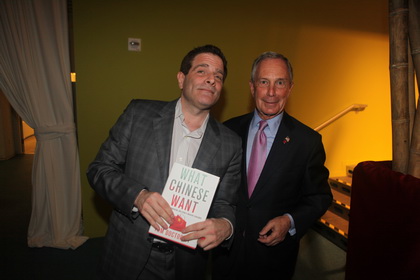A report, led by New York Mayor Michael Bloomberg, has claimed that the US is losing foreign graduates and workers vital to its economic future to countries with more flexible visa policies. It also calls for foreign science, technology, engineering and maths graduates (STEM) in the US to be given work visas, as part of a raft of reforms proposed to reverse the trend.
News and business analysis for Professionals in International Education
Have some pie!
US must retain overseas talent, says Bloomberg
 Michael Bloomberg, right, at book launch "What Chinese Want", 29 May: Kristen Artz/NYC.gov
Michael Bloomberg, right, at book launch "What Chinese Want", 29 May: Kristen Artz/NYC.gov “America has always been a magnet for the world’s most talented and hardest working,” explained Bloomberg in a statement. “But we are quickly losing our edge as other countries adopt smarter economic-driven immigration policies.”
The report, by Bloomberg’s immigration think tank The Partnership for a New American Economy with the Partnership for New York City, identifies a number of major challenges facing the US that make reform essential.
These include a shortage of workers as baby boomers start retire en masse, and a worrying slowdown in new business startups – an area historically boosted by immigrant entrepreneurs.
It also flags a shortage of domestic graduates in STEM fields – vital for driving economic growth – and notes students from overseas are more likely to take these disciplines (about 60% of all foreign graduate students in the US in 2010 took STEM courses).
“The growth rate of American students majoring in STEM fields is among the slowest of any category,” the think tank said. “As a result, the US faces a projected shortfall of 230,000 qualified advanced-degree STEM workers by 2018.”
The report pours ire on the US immigration system for hurrying along the trend, citing limits on residence visas for foreign students graduating from American universities as a key problem.
It juxtaposes this with the policies of other major economies, such as Chile and Singapore, which offer incentives to graduates wishing to start businesses – or Canada, which is actively recruiting skilled foreigners trained in the US thanks to its more flexible border regime.
“The US faces a projected shortfall of 230,000 qualified advanced-degree STEM workers by 2018”
Another worry is that student source countries such as China, India and Brazil are offering “investment, visa and tax incentives” to students who return to work in their home countries.
Dr Zhang Yuanbo, a physics professor interviewed for the report, said he chose a research role in Shanghai over one in the US, in part due to problems renewing his J1 foreign worker’s visa.
“The entire [visa] process takes too long,” said Zhang, who was also given a financial sweetener to come home by the Chinese state. “If the US simplified things, it would be a big motivation for students to remain in America.”
The Department of Homeland Security has proposed a series of reforms to tackle the problem and extended post-study work rights (Optional Practical Training) in some STEM degree categories this month. While welcoming the move, NAFSA’s director of immigration policy, Heather Stewart, said the DHS needed to expand the scheme to “talented individuals outside technical and scientific fields.”
Still looking? Find by category:



4 Responses to US must retain overseas talent, says Bloomberg